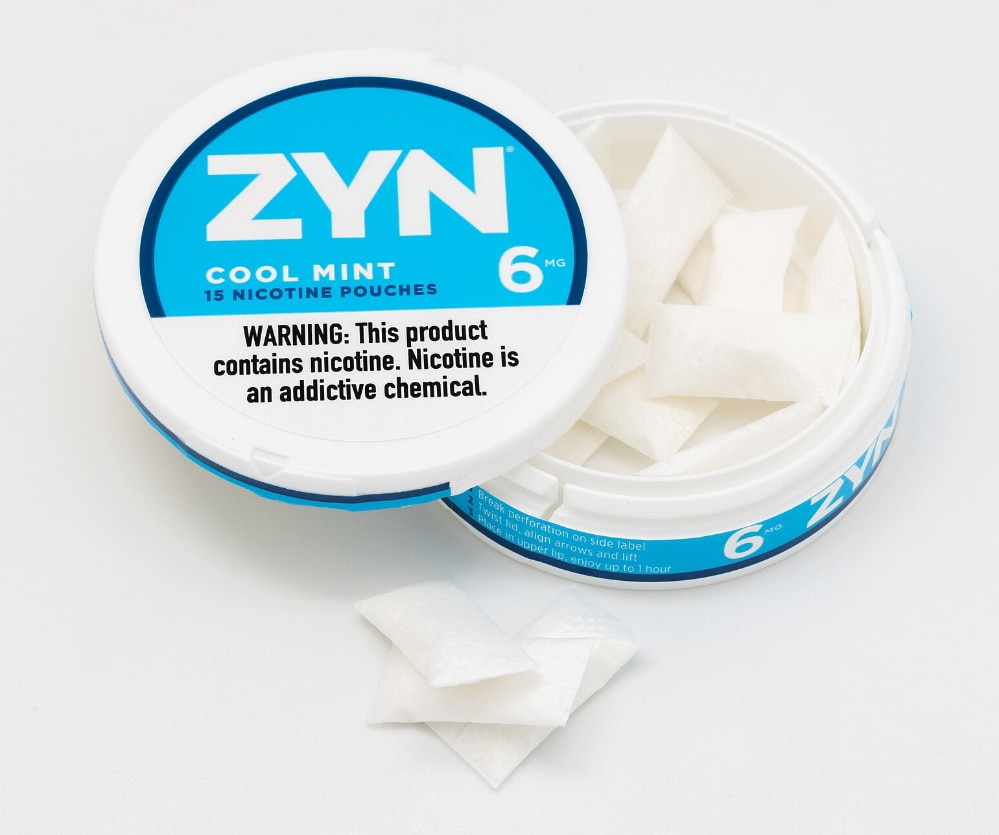“ZYNfluencers” Nurturing a “Plague” of Nicotine Pouch Addiction

Imagine you’re the sales director for a big tobacco company. Talk about a tough job! You have to convince more people to consume a toxic product in order for sales to grow. Tobacco without nicotine just doesn’t keep customers coming back. But what if you could sell the nicotine without tobacco attached? If that was legal, it could be a massive moneymaker.
Imagine no more. In 2008, the Swedish company Niconovum developed a new delivery mechanism for powdered nicotine: a permeable pouch placed discreetly between the upper lip and the gums. The company was acquired by Swedish Match, and the product was rebranded as ZYN. Initially marketed as a smoking-cessation aid, ZYN’s manufacturer was purchased in 2022 by — wait for it — the largest tobacco company in the world, Philip Morris International.
Bring on the ZYNfluencers! The 2024 U.S. presidential election surfaced a major weakness in election finance laws. Social media influencers raked in millions of dollars without having to disclose sponsorships by political action committees. In a similar manner, Philip Morris is able to shovel millions of dollars to ZYNfluencers on TikTok, Instagram, YouTube, and other social media outlets without the ZYNfluencers disclosing the relationship.
Is it any wonder that the harmless looking pouches are showing up at high schools and college campuses across the US? The USD Vista, weekly campus newspaper of the University of Southern California San Diego, offers an unsponsored view of the “ZYN-demic” plaguing the USD campus: Photos of discarded ZYN pouches (“gross”) strewn all about the university’s grounds.
USD psychiatrist, Dr. Gabriel Hernandez, explains how students are getting hooked on ZYN:
[ZYN] directly increases a chemical in our brain called dopamine, resulting in pleasure or a feeling of being rewarded… [T]he brain adapts by upregulating the number of nicotinic receptors due to constant desensitization caused by nicotine. With more of these receptors, the individual’s cravings for more nicotine [are] amplified.
The USD Vista notes, “The popularity of Zyns spread quickly throughout TikTok with influencers using the pouches.” Are ZYN pouches being used as a smoking-cessation aid, or are they actually a gateway drug for nicotine addiction? They are being marketed aggressively to people who have never smoked or vaped. Not surprisingly, a study co-led by the Keck School of Medicine at USC showed negligible use of nicotine pouches among adults:
- Only 2.9% of adult U.S. smokers had ever used a nicotine pouch.
- Only 5.2% of relapsed adult smokers reported trying nicotine pouches.
- In the same 3-year period, U.S. nicotine pouch sales increased 641%.
Who’s buying all those pouches, if not adults using ZYN to quit smoking or quit vaping? If you guessed teenagers using ZYN as a study aid or a “non-harmful” alternative to smoking or vaping, that’s a good guess. Does Philip Morris’ purchasing ZYN manufacturer, Swedish Match, and marketing the product through ZYNfluencers who do not disclose sponsorships have anything to do with the growing “ZYN-demic”?
Let’s ask the researchers. The British Dental Journal is hip to the phenomenon of pushing ZYN to teens. The journal notes in a recent article that, “Zyn’s flavoured options, such as citrus, coffee, and mint, may inadvertently appeal to younger demographics.” I’m not sure the word “inadvertently” is warranted, since Philip Morris is certainly adverting. The article describes the periodontal dangers of prolonged ZYN use.
The Journal of Psychosocial Nursing and Mental Health Services sounded the alarm on ZYN just last month, calling the use of nicotine pouches “a growing public health concern.” The article calls for “urgent action” and “stronger regulatory measures,” noting:
ZYN products have gained widespread popularity, fueled by youth-targeted marketing, appealing flavors, and social media influencers. Despite their perceived safety, ZYN pouches deliver high doses of nicotine, raising concerns about addiction, dual use with other tobacco products, and long-term health consequences.
Among the marketing tactics called out by the researchers is Philip Morris’ use of reward points (which tobacco companies began using 100 years ago) to boost sales of ZYN and appeal to younger audiences. Researchers are calling for an end to the “gamification of addiction” and the use of reward points and prizes to boost the sales of a substance known to be highly addictive. A tobacco giant pushing nicotine addiction in the guise of a stop-smoking remedy? As the British band, The Who, once sang: Meet the new boss, same as the old boss.
Written by Steve O’Keefe. First published July 7, 2025.
Sources:
“ZYN-demic plagues USD,” The USD Vista, September 26, 2024.
“Rise of nicotine pouches: Are they fueling a hidden addiction?,” KABC Los Angeles, June 20, 2025.
“Nicotine pouches: a harm reduction breakthrough or a flavoured trap?,” British Dental Health, February 28, 2025.
“Oral Nicotine Pouches: A Growing Public Health Concern,” Journal of Psychosocial Nursing and Mental Health Services, June 1, 2025.
“Prevalence of Nicotine Pouch Use Among US Adults,” JAMA Network, July 10, 2024.
Image Copyright: Aphis Marta, used under Creative Commons license.




